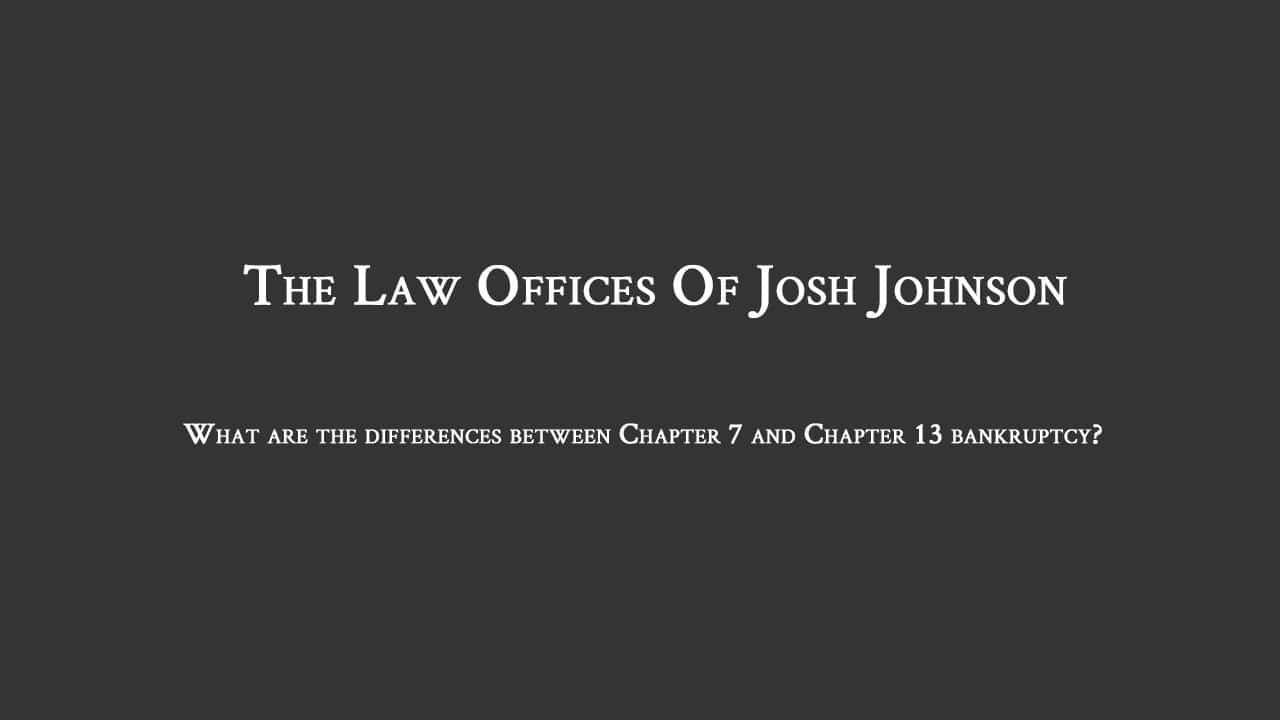Chapter 7
Chapter 7 bankruptcy, sometimes referred to as a “liquidation”, can provide an opportunity for eligible debtors to receive a discharge of certain debts relatively quickly. Individuals or married couples can file for relief under Chapter 7 of the U.S. Bankruptcy Code. A number of factors will be taken into account when you meet with your attorney to determine if you are eligible for Chapter 7 bankruptcy, including your income over the past six months and your income and expenses moving forward from the bankruptcy filing. Often, debtors whose income is below the median income for their household size and district, and who do not have sufficient funds to pay for anything in excess of their ordinary living expenses, can qualify for Chapter 7. Other factors apply, including whether or not the debtor has ever previously filed for bankruptcy, so be sure to answer your attorney’s questions completely during your initial meeting.
In Chapter 7 bankruptcy, a Chapter 7 trustee is appointed to oversee the “bankruptcy estate”, which means the assets within the bankruptcy. He or she is tasked with collecting non-exempt assets and distributing them to creditors. However, many debtors who are eligible for Chapter 7 do not have significant (if any) non-exempt assets. Most Chapter 7 clients of The Law Offices of Josh Johnson are able to “exempt” and keep all of their personal property. The federal bankruptcy code allows for exemption of property up to certain value limits within various categories. For example, as of September, 2020, individual debtors can generally exempt up to $13,400.00 in household goods and furnishings; up to $1,700.00 in jewelry; up to $4,000.00 in one automobile; and up to $13,900.00 in any type of other property (including cash, bank accounts, etc.), subject to certain limitations. Exemption planning is a complex area of the law and you should speak to your attorney about your specific situation in order to receive accurate advice about what property may be exempt in bankruptcy.
There are several advantages to Chapter 7 bankruptcy. First, it is possible to obtain a discharge of eligible debts within four or five months of your initial meeting with your attorney. Second, once a discharge is ordered by a bankruptcy judge, the debtor does not have to pay anything back to creditors for debts that were discharged. (Keep in mind that certain types of debt, including student loans, are rarely dischargeable, and that other types of debts, including tax debts, require careful analysis by your attorney in order to determine discharge ability.) Attorneys’ fees are generally lower for Chapter 7 bankruptcy than for other types of bankruptcy, although they must usually be paid in full before you case is filed, because your attorney cannot attempt to collect a debt for legal fees from you after you have filed for bankruptcy.
There are also several disadvantages to Chapter 7 bankruptcy. First, if the debtor has significant non-exempt property, he or she will have to relinquish that to the trustee for distribution to creditors. Second, it can be difficult to obtain credit cards or qualify for mortgages after a Chapter 7 bankruptcy appears on your credit history. Third, Chapter 7 does not offer debtors any way to address or restructure high-interest secured loans (like car loans) or to pay back mortgage arrears. Finally, the discharge for Chapter 7 debtors is not as broad as the discharge available for Chapter 13 debtors.

Chapter 13
Chapter 13 bankruptcy is a type of bankruptcy that offers debtors an opportunity to repay creditors a certain amount of their debts over a specified period of time. Chapter 13 is open to debtors who have regular income and whose debts are under certain limits. In Chapter 13, debtors agree to a payment plan over a three- or five-year period. If approved by the Court, that payment plan allows the debtor to retain his or her property during bankruptcy, while paying back his or her creditors a certain percentage of debts. If the debtor successfully completes the payment plan, he or she receives a discharge at the end of re-payment period, and is able to keep all property, exempt and non-exempt.
The amount of the monthly payment is a very complex determination, and in order to be approved by the bankruptcy court, the Chapter 13 Plan must meet certain requirements. First, unsecured creditors must receive at least as much as they would have had the debtor filed for Chapter 7 bankruptcy; this is determined by analyzing how much of the debtor’s property would have been non-exempt in Chapter 7 bankruptcy. Second, mortgage arrears must be cured in full by the end of repayment plan. Third, priority debts (including certain taxes and child/spousal support) must be paid in full through the plan. Finally, the debtor must put all of his or her “disposable income” into the plan; the determination of disposable income is also a complicated calculus. There are other factors that go into creating a Chapter 13 Plan as well. Your attorney will ask you for a large amount of documentation in order to complete a thorough review of your income and expenses over the past six months and moving forward. At that point, your attorney will discuss with you a proposed Chapter 13 Plan payment amount.
Chapter 13 may be an option for debtors who earn too much money to qualify for Chapter 7 bankruptcy, but it may also be a good option for debtors who are behind on mortgage or auto loan payments; those who have certain types of debts that are not dischargeable in Chapter 7 bankruptcy; or those who have priority tax or child/spousal support arrearages that need to be paid back. Speak with your attorney to determine what may be a good option for you.
Some advantages of Chapter 13 bankruptcy include the ability to pay your attorney’s fees in your Chapter 13 plan; the ability to restructure high-interest auto loans; the ability to pay back mortgage arrears through the plan; the ability to pay priority tax and child support arrears through the plan; the ability to retain all property during bankruptcy; and some protections for co-debtors.
Some disadvantages of Chapter 13 bankruptcy include: the debtor must successfully make payments over a three- or five-year payment plan in order to obtain a discharge of his or her eligible debts; attorneys’ fees tend to be higher than in Chapter 7; and the Chapter 13 trustee will monitor income tax returns and other documentation throughout the payment plan in order to ensure that all disposable income is going toward repayment of creditors.
Conclusion
This blog post is a general overview of some differences between Chapter 7 and Chapter 13 bankruptcies and is not legal advice. Please consult with your attorney to discuss options that may be best for your particular financial situation.
We can help. Contact us to begin discussing your case.
Sitemap
Minneapolis Office
310 Fourth Avenue S #7000
Minneapolis, MN 55415
(612) 730-1738
St Paul Office
656 Selby Avenue Suite 230
St. Paul, MN 55104
(651) 785-5342
Copyright © 2020, Josh Johnson Attorney at Law


